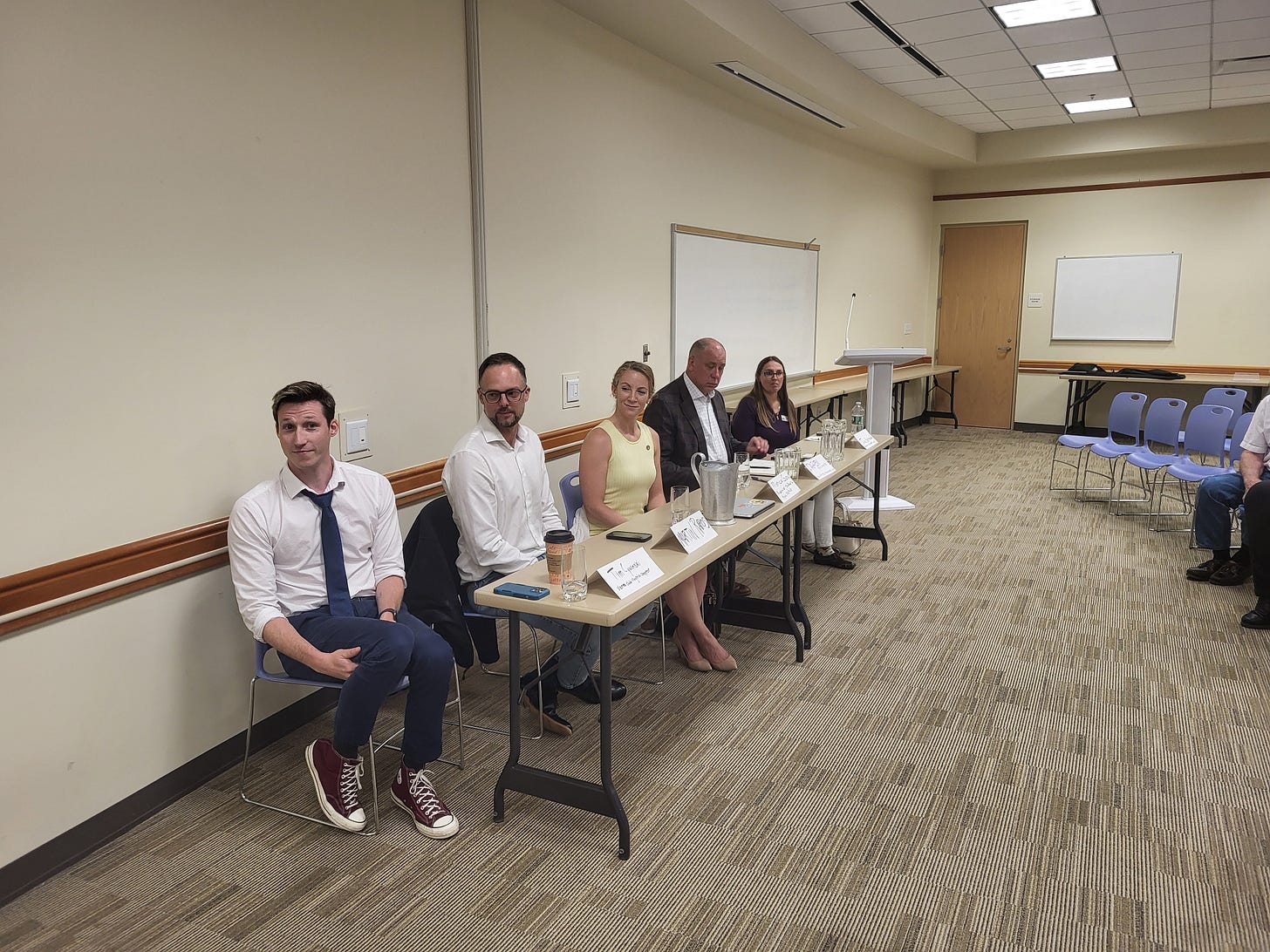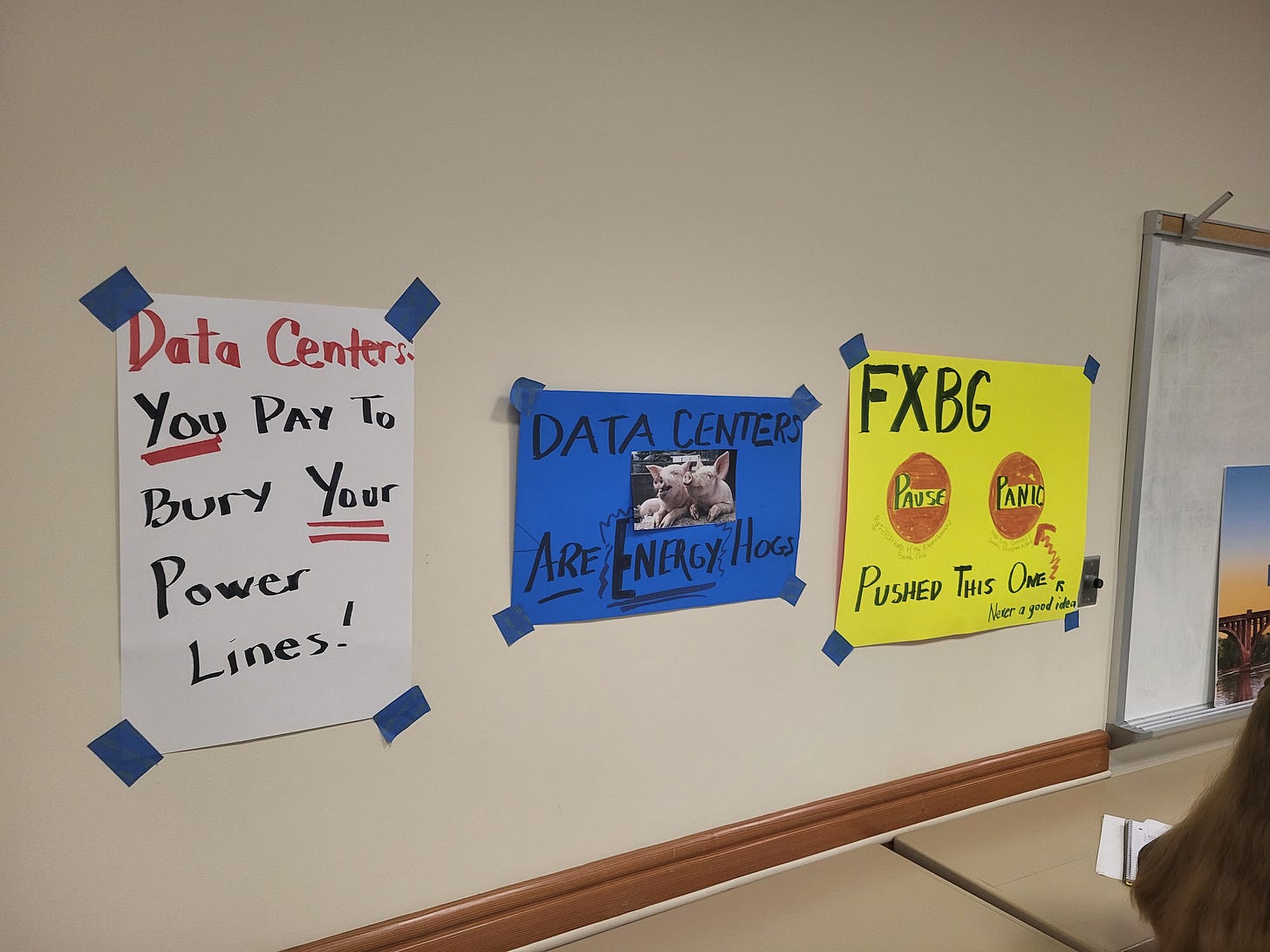Data Center Panel Balances Attacks, Ideas
Panel was hosted by Inform Fredericksburg and the Sierra Club.
By Martin Davis
EDITOR-IN-CHIEF
Email Martin

Wednesday night’s data center panel featured two industry spokespersons, two environmental activists, an elected official, and a balance of attack and information.
Co-hosted by the Sierra Club and Inform Fredericksburg, the meeting included an episode in which several individuals either directly or indirectly associated with the data center industry who did not accept an invitation to speak were called out for not attending.
The incident—which was inflammatory in the moment but was resolved later when the affected parties talked—was a reminder that the data center issue is both emotional and complex.
The evening’s discussion touched on the use of renewable energy sources at data centers, the levels of water required, and the amount of energy that data centers require and the associated costs.
In her closing remarks, Julie Bolthouse of the Piedmont Environmental Council said that “we have a problem. We have an energy problem; we potentially have a water issue…. we also have a generator issue, an air quality issue. All of these things are piling on” and the impacts are becoming “extreme.” She also quoted an unnamed source stating that the last two years have been “so chaotic I can’t tell you what’s going to happen next year.”
She went on to say there are 180 million square feet of data centers approved and unbuilt in Virginia, and called for “oversight and transparency” and for a pause in building.

Daren Shumate, an engineer from Fairfax involved in designing data centers, followed her comments by noting the extent to which our everyday lives are tied to data centers through big issues like healthcare, traffic control, and airlines. “Everything is on the cloud, which means it’s in a building, on a computer and server, in a rack that takes power” that has to be cooled. He added that “we need to focus on how we efficiently cool.”
Martin Raps, who is CIO of Flexnode, closed by noting that data centers are large so that they can hide their “technological inefficiencies.” He also noted that we are coming to a stage where “we will be able to have data centers at substations,” which will “make it environmentally … without any effect.” This is coming within the next decade, he said.
Tim Cynwinski, Sierra Club of Virginia, was the last to offer closing comments and noted this is a “complicated issue,” and it’s his job to “make it simple.”
He attempted to do that that by rolling out the following “facts.” First, “Virginia is the data center capital of the world.” Second, “Dominion Energy has said the only reason we need more power plants that are polluting sources is because of data centers.” Third, “The only way … to power the data centers that are already approved is to raise our … monthly electric bills … a lot.”
“Fredericksburg,” he continued, “can be a beacon for the rest of this state … [by saying] we’re not going to be bullied by Google or Amazon … If you want to build here you’ve got to pay for your own power … you have to pay for the transmission lines.”
He then said, “you can pass a local law that says that. Maybe there’ll be some issues with the Dillon Rule, which blah, blah, blah, blah, blah.” To those who would say you can’t do that, Cynwinski said, “challenge them on it.”
The Advance asked Shumante afterwards what he thought of Cynwinski’s claims, and Shumante challenged the idea that ratepayers are shouldering all the energy costs to bring power to data centers. “I don’t think it’s completely true that the rate payers are paying for all the costs,” he said.
Fredericksburg City Council member Will Mackintosh told the Advance that Cynwinski “yadda, yadda, yadda-ed away the Dillon Rule, which obviously … cannot be handwaved away … When we’re talking about the big structural issues with data centers around power … we in a very real sense do not control [that].”
He continued by turning on its head Cynwinski’s call for Fredericksburg to stand up against data center expansion. “Saying no to data centers,” Mackingtosh said, is not a way forward. “I think the Fredericksburg region needs to be a leader in the state, but I’m not sure that saying no to data centers constitutes leadership.”
Mackintosh then turned to economics, noting that because Fredericksburg is a small jurisdiction, with a small budget, “were we to add one 2 million square foot data center, we’re talking about a potentially $35-40 million a year increase in our budget, and our budget alone is only $128 million.”
“I don’t feel I have the luxury to make that kind of stand on principle when we’re talking about the kinds of transformational investments in our local environment, in our schools, in our public safety … all those things we all want.”
Local Obituaries
To view local obituaries or to send a note to family and loved ones, please visit our website at the link that follows.
Support Award-winning, Locally Focused Journalism
The FXBG Advance cuts through the talking points to deliver both incisive and informative news about the issues, people, and organizations that daily affect your life. And we do it in a multi-partisan format that has no equal in this region. Over the past month, our reporting was:
First to report on a Spotsylvania School teacher arrested for bringing drugs onto campus.
First to report on new facility fees leveled by MWHC on patient bills.
First to detail controversial traffic numbers submitted by Stafford staff on the Buc-ee’s project
Provided extensive coverage of the cellphone bans that are sweeping local school districts.
And so much more, like Clay Jones, Drew Gallagher, Hank Silverberg, and more.
For just $8 a month, you can help support top-flight journalism that puts people over policies.
Your contributions 100% support our journalists.
Help us as we continue to grow!










I feel like neither the Sierra Club nor Data Center operators are presenting a balanced perspective based on their interests. But I do think the idea of a data center in Fredericksburg is worth entertaining.
Councilor Mackintosh has a good point that the economics could be favorable to the city, filling operating coffers and providing much-needed funding for things like education. I like that data centers compared to other development projects wouldn't require the same public burden for road and infrastructure improvements (outside of public utilities), police, fire, etc. that something like a shopping center would. The one watch-out is that local governments need to be careful about extending tax incentives that look great when the project is approved but never pay off.
I’ve heard Councilor Mackintosh's reference the Dillon Rule on multiple times now as a reason why City Council can’t act on different issues. I’m not sure it’s quite as limiting as he thinks. Local governments have some tools in their toolbelt that have been used successfully for decades to regulate while staying within the bounds of the rule. Here are a few examples:
Zoning Ordinances
Arlington County has detailed zoning ordinances that specify different zoning districts for various types of businesses. For example, certain areas are designated as commercial districts where retail stores and restaurants can operate, while others are designated for light industrial or office uses. This zoning helps ensure that business activities are compatible with surrounding land uses and community goals.
Loudoun County has specific zoning classifications for agricultural and rural business activities. This zoning helps protect agricultural land and ensures that businesses like wineries or equestrian facilities operate in areas suited to their activities, preventing conflicts with residential areas.
Alexandria, businesses in historic districts are subject to zoning regulations that preserve the architectural integrity of these areas. Businesses must adhere to specific design guidelines that align with the historical character of the district.
Business Licenses
Henrico County requires businesses operating short-term rental properties to obtain a special business license and pay a transient occupancy tax. This regulation ensures compliance with local regulations and generates revenue for the county.
Norfolk charges different license fees depending on the type of business, such as higher fees for businesses in sectors like professional services or retail. This helps the city manage the economic impact of different types of businesses and fund local services.
Conditional Use Permits
In Virginia Beach, certain types of businesses, such as bars or nightclubs, may require a conditional use permit to operate in particular zoning districts. The city reviews applications for these permits to ensure that proposed businesses meet specific conditions related to noise, traffic, and impact on surrounding areas.
Charlottesville may grant conditional use permits for urban farms within certain zoning districts. These permits allow urban agriculture to take place in areas where it might not otherwise be permitted, subject to conditions related to scale, impact on neighboring properties, and compliance with city regulations.
Virginia Beach issues conditional use permits for outdoor entertainment venues such as concert halls or sports arenas. These permits typically include conditions related to noise levels, event hours, and traffic management to mitigate any potential impact on surrounding neighborhoods.
A data center might be allowed to operate if it obtains a conditional use permit, which may come with specific conditions to mitigate negative impacts. Local governments might deny the permit or impose stringent conditions that make the project less feasible or appealing.
Utility and Infrastructure Limitations
Local governments can control access to necessary infrastructure such as water, electricity, and sewage systems. If a data center requires infrastructure upgrades that are deemed impractical or undesirable, the local government might deny or delay connections.
Data centers can be energy-intensive. Local governments might cite concerns about exceeding existing utility capacities or the need for significant infrastructure upgrades as reasons to prevent or delay construction.
Of course, they can’t go beyond the authority granted by the State Legislature but their hands are not tied.